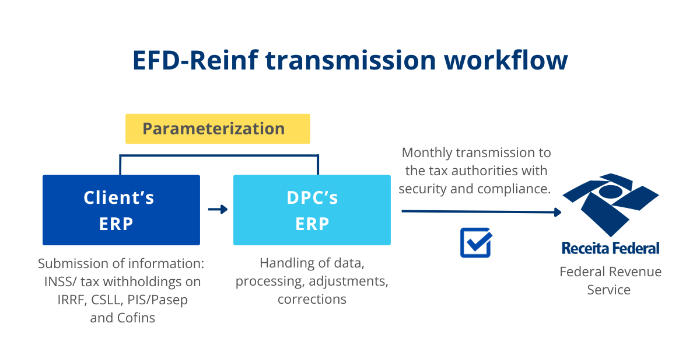EXPERT OPINION
Dirf replacement by EFD-Reinf: companies should adapt systems for the new moment
With the transition to the EFD-Reinf, tax authorities will demand information to be supplied more promptly and in greater detail
By Luiz Carriço
The transition from the Withholding Income Tax Return (DIRF) to the Digital Tax Bookkeeping of Tax Withholdings and Other Fiscal Information (EFD-Reinf) is in full swing and its impacts are already felt in the routines of companies across all sizes. Besides adjusting overall tax management procedures, business executives should bear in mind the pivotal role that technology plays in this new age.
Starting in 2025, the DIRF will be completely phased out for reporting taxable events occurring from 2024 onwards. Tax information currently reported using this document will have to be provided through the EFD-Reinf.
In this new era, where the Federal Revenue Service's auditing capacity is expected to increase, businesses must focus on adapting their management systems to meet the agency’s requirements as effectively as possible.
We are moving from a time where generic information was submitted annually through the DIRF, to a new framework where EFD-Reinf submissions are required every month, containing more specific and detailed information.
From the DIRF to the EFD-Reinf: what is new?
One of the milestones in this transition was the introduction of the R-4000 series into the EFD-Reinf, effective from the assessment period starting September 2023. This series of events is used to report tax withholding information pertaining to Income Tax (IRRF) and social security contributions (CSLL, PIS/Pasep and Cofins).
Main events in the R-4000 Series
R-4010 – Payments/credits to individual beneficiaries R-4020 – Payments/credits to legal entity beneficiaries R-4040 – Payments/credits to unidentified beneficiaries R-4080 – Withholding on receipt |
The EFD-Reinf is comprised of event modules, each consisting of different XML files that collectively form the digital bookkeeping for a specific assessment period. With the introduction of the new R-4000 series, there has been a significant increase in the volume of data. Below are some other noteworthy changes:
Upcoming changes |
DIRF |
EFD-Reinf |
|
Frequency |
Annual basis (filed in February of each year) |
Monthly basis, filed by the 15th |
|
Tax collection x Reporting (From the taxable event) |
The tax is paid throughout the calendar year, but the return is only filed in February of the following year. |
The payment of the tax and the submission of ancillary obligations are now connected. |
|
Level of information detail |
Generic content, revenue codes are required. |
Greater detail, income nature codes are required for the automatic definition of revenue codes. |
|
Inspection capacity |
The time gap between the taxable events and the submission of returns makes it harder to identify errors. |
Simultaneous compliance with primary and ancillary obligations facilitates inspection. Data is automatically cross-checked against other reports in the SPED environment. |
The Federal Revenue Service recently issued a note recommending comparisons and adjustments, primarily to align with the change in reporting frequency.
Once the EFD-Reinf has taken on its new role, taxpayers can expect an intensification of data cross-checks by tax authorities.
It is also worth pointing out the requirement to classify the nature of income, a task that many companies today struggle to perform correctly.
Faced with these new challenges, companies should invest time in mapping out tax processes, evaluating key business operations, reviewing accounts payable registrations and parameterizing their systems in order to prevent tax risks.
Discontinuation of the DIRF
The submission of the last DIRF by taxpayers is scheduled for February 2024. Read more here.
This report will no longer be required for taxable events ocurring on or after January 1, 2024. However, the corresponding debts will need to be entered into the DCTFWeb from that date onwards.
Technology contributes to EFD-Reinf compliance
To ensure proper compliance, it is essential to rely on highly specialized technology that remains up to date with the legislation. In this day and age, electronic tax systems are indispensable in a company’s routine, as they contribute to the optimization of the entire tax management process.
As such, DPC uses ERP to collect tax data from its clients and to handle information that must be entered into the EFD-Reinf and other reports. This solution checks for inconsistencies and allows for preventive amendments, ensuring that all information is submitted to the Federal Revenue Service in full compliance with the requirements.

*Enterprise Resource Planning or “ERP” is an integrated management system used for maintaining a company's various data in a single database.
To ensure tax compliance, it is imperative that taxpayers be aware of this new scenario and adapt to the rules, giving particular attention to the preparation of the systems that will assist in the transition.
Tax and system solutions
To address the situation, DPC assists in mapping out the impacts of the recent tax changes on each client's operation, providing specialized support to help them adapt to the new scenario. From system parameterization and adjustments to comprehensive tax management for the business, you can rely on our team at DPC: dpc@dpc.com.br.

Autor: Luiz Carriço, partner at Domingues e Pinho Contadores.
How DPC may help your company?
Domingues e Pinho Contadores has specialized team ready to assist your company.
Contact us by the e-mail dpc@dpc.com.br
See more
Sign up for our Newsletter:
Are you interested?
Please contact us, so we can understand your demand and offer the best solution for you and your company.

Rio de Janeiro
Av. Rio Branco 311, 4º e 10º andar - Centro
CEP 20040-903 | Tel: +55 (21) 3231-3700
São Paulo
Rua do Paraíso 45, 4º andar - Paraíso
CEP 04103-000 | Tel: +55 (11) 3330-3330
Macaé
Rua Teixeira de Gouveia 989, sala 302 - Centro
CEP 27910-110 | Tel: +55 (22) 2773-3318



